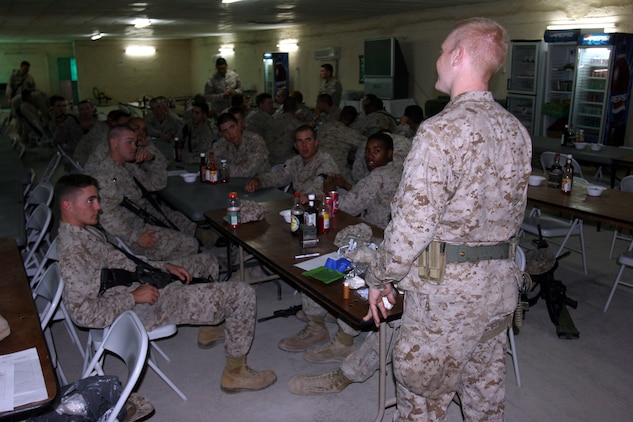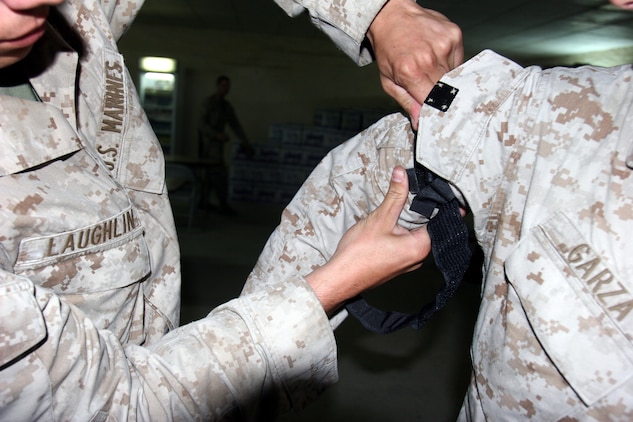Portfolios
USMC IFAK Individual
First Aid Kit
Previous
Next

@Webbingbabel Colletion /webbingbabel.blogspot.com
USMC INDIVIDUAL FIRST AID KIT (2005) 2005
The Resource Center Allied Industries (2005)
DETAILS
NSN
8105-09-000-2725
8105-09-000-2725 (Year 2005) Dimensions 6.5" L x 2.5" W x 8" H Accession number P5159
SUMMARY
Early inn 2003 the US Marine Corps, Marine Corps System Command fielded a new individual first aid kit (IFAK) for use by Marine Corps and US Navy medical personnel. They were first issued in small numbers in Afghanistan, then thousands were provided to equip Marines going into Operation Iraqi Freedom in 2003.By 2004 the new kit was available to every Marine as a standard part of the USMC Individual equipment, a total of 213,000 deployed. The new first aid kit is designed to be more compact and have a greater life saving capability for those with severe bleeding from combat wounds.
In addition to the Marine Corps, the Air Force Medical Service and other units of the U.S. military have adopted the USMC-developed Individual First Aid Kit.
Components of the USMC Individual First Aid Kit
Components of the USMC Individual First Aid Kit of 2003
The USMC Individual First Aid Kit of 2003 in enclosed by its Pouch (NSN 8105-09-000-2725) and consists of two modules:
Trauma Kit (NSN 6545-09-000-2726)
Minor First Aid Kit (NSN 6545-09-000-2727)
The Trauma Kit includes these components:
Bandage, Elastic, NSN 6510-01-503-2109 (2 EA)
Bandage, Gauze, NSN 6510-01-503-2117 (2 Rolls)
Tourni-Kwik Tourniquet, One Handed, NSN 6515-01-504-7030 (1 EA)
Wound Pack (QuikClot), Hemostatic Treatment, NSN 6545-01-499-9285 (1 EA)
The Trauma Kit is a vacuum-sealed package (photo, above), containing the above items. This package is to be opened only in an emergency. Once the Trauma Kit vacuum seal is broken, consumable items in the Trauma Kit cannot be individually requisitioned and the partial contents must not be returned to the pouch. A new Trauma Kit must be ordered.
Within the Trauma Kit is the wound pack known as QuikClot, an item with a shelf life of three years from the date of packaging, marked on the outside of the vacuum-sealed bag. Expired Trauma Kits must be replaced.
The Minor First Aid Kit includes these components:
Bandage, Adhesive ¾" x 3", NSN 6510-00-913-7909 (10 EA)
Dressing, Burn 4" x 16", NSN 6510-01-243-5894 (1 EA)
Povidone-Iodine Topical Solution. USP. 10% 1/2 Fl. Oz. Bt, NSN 6505-00-914-3593 (1 Bottle)
Water Purification Tablet, Iodine 8 mg., NSN 6850-00-985-7166 (1 Bottle)
Triangular Bandages 40" x 40" x 56" NSN 6510-00-201-1755 (1 EA)
Bandage, Adhesive 2" X 4.5" NSN 6510-01-514-4518 (5 EA)
xx






GLOSSARY
Contemporary
Drawing
Edition
Landscape
Portfolio
PORTFOLIO
AUDEN POEMS - MOORE LITHOGRAPHS
SHARE
Share on Facebook
Share on Twitter
Share on Pinterest
PAST EXHIBITIONS
USMC IFAK Individual First Aid Kit 2005 2015
UK, Winchester, The Gallery, Winchester Discovery Centre
HENRY MOORE FIGURES 2003
Germany, Heikendorf, Kunstlermuseum 2002
Germany, Gera, Otto Dix Haus 2001
Germany, Hamburg, Ernst Barlach Haus
HENRY MOORE PORTFOLIO PRINTS 1950-1981 1991
Australia, Australia 1982
Canada, Canada
Brazil, Brazil
Peru, Lima, Peru
Chile, Chile
Colombia, Colombia
Venezuela, Venezuela
Portfolios
xx
Previous
Next
hhhhhhhhhhhhhhhhhhh
USMC Individual First Aid Kit (IFAK)


USMC Individual First Aid Kit (IFAK) CONTENTS:
This is the configuration of the IFAK that has been shipping for about a half-decade. However, a newer and much more-expensive USMC IFAK configuration is available (if requested), which replaces the 2ea H-bandages with 2ea CAT Tourniquets. It also adds Quikclot Combat Gauze. If you would like to purchase this newer configuration, please contact us at (703) 269-0013 for pricing and availability.
(1ea) Pouch, NSN 8105-09-000-2725
IFAK A1 Component Individual First Aid Kit -
NSN 6545-01-539-2740 (includes the following items):
(1ea) 3.5 oz. Quikclot Packet - NSN 6510-01-499-9285 NOTE: As of 31 AUG 2011, the USMC IFAK is no longer shipping with Quikclot powder.
(2ea) TK4 Tourni-Kwik Self-Application Tourniquet 40" - NSN 6515-01-542-7696
(2ea) "H" Compression Bandage w/8" x 10" Ab Pad - NSN 6510-01-540-6484
(2ea) Primed Compressed Gauze 4.5" x 4.1 yards - NSN 6510-01-503-2117
IFAK A1 Minor First Aid Kit Component
NSN 6545-09-000-2727 (includes the following items):
(5ea) Adhesive Bandage 2" x 4 1/2" - NSN 6510-01-514-4518
(10ea) Adhesive Bandages, 3/4" x 3" - NSN 6510-00-913-7909
(2ea) Triangular Bandages, 40"x40"x56" Non-sterile - NSN 6510-00-201-1755
(1ea) Combat Reinforcement Tap 2" x 100" - NSN 6510-01-549-0927
(1ea) Burn Dressing 4" x 16", Water-Jel - NSN 6510-01-243-5894
(8ea) Bacitracin Antibiotic Oinment 0.9 gram
(1ea) Povidone-Iodine Topical Solution USP 10% 1/2 floz. - NSN 6505-00-914-3593
(1ea) Water Purification Tablets 10 Pack, Katadyn Micropur, Sodium Chlorite - NSN6850-00-985-7166
USMC IFAK Training Kit:
IFAK Training Kit, NSN 6545-09-000-3081
(1 ea) Training Kit Pouch NSN 6545-09-000-3553
(1 ea) Quick Clot Empty Bag NSN 6515-09-000-3552
(1 ea.)Tourniquet #1 NSN 6510-09-000-3551
(1 ea.) Gauge Bandage NSN: 6510-01-503-2117
(1 ea.) Cinch-Tight Non Vacuum NSN 6510-09-000-3371
AR RAMADI, Iraq --On the battlefield, the difference between life and death is often very small. Little things like proper first aid skills and administration of ‘buddy aid’ often prove to be the difference between Marines coming home safe or not at all. While Navy corpsmen are usually attached to every unit that goes on a patrol, convoy or raid, sometimes it’s those few precious moments before the corpsmen can make it to the injured Marine that will make the difference. To help Marines understand the importance of these skills and to show them the basics of the new Individual First Aid Kit, two corpsmen from 3rd Battalion, 7th Marine Regiment’s battalion aid station recently conducted a class on the IFAK and the new tourniquet system being given to Marines deployed to Iraq. “These classes are pretty important for every person deployed,” said Seaman Apprentice Jeremy Trythall, a hospital-man apprentice here. “We are trying to show everyone exactly how to use their IFAK, just in case something happens.”The class took place in the Camp Hurricane Point chow hall, a camp on the outskirts of Ar Ramadi. The class was informal, and provided plenty of opportunities for the members of the class to ask questions.“They asked a lot about the quick clot agent included in the IFAK,” Trythall said. “They were also interested in the new tourniquet that is being handed out to the Marines here. Overall, I would say the class went very well.”The class started off reviewing basic first aid skills, then emphasized the importance of applying proper first aid skills in a combat environment. Being able to save fellow Marines during combat is just as important as being able to fight and shoot, said the 23-year-old from Raymondville, Mo. The Marines in the class, a mix from Headquarters and Service Company and Company K, all seemed to come away with a little more confidence in their ability to perform first aid under pressure.“The class was good for the Marines here, I think,” said Lance Cpl. Micah Garza, a cook currently assigned to the guard force here. “I know I feel more confident in the IFAK and what to do with it.”Classes like these will be given periodically throughout 3rd Battalion, 7th Marine’s deployment, said Trythall. “It’s important simply because if their buddy is injured and a corpsmen isn’t close by, they need to know what to do,” he said. “Corpsmen aren’t always around and with the proper knowledge, Marines will know what to do and won’t freeze up.”


No comments:
Post a Comment